(Note: If you haven’t read it yet, my introductory post on this Star Trek: The Original Series rewatch is a good place to start.)
Original Air Date: December 6, 1968
Crew Death Count: 0 (but both members of the Minara II research party are killed)
Bellybuttons: 0 (Kirk’s topless torture scene is a close call!)
Imagine if Jesus didn’t need to actually be crucified, but could redeem humanity by simply demonstrating a willingness to be crucified. That’s the premise of “The Empath” in a nutshell. This week, the Enterprise arrives at the planet Minara II to evacuate two scientists posted there to observe Minara as it nears supernova stage. Except the landing party of Kirk, Spock, and McCoy finds the scientists have been killed by two technologically advanced aliens who are conducting some shady research of their own involving torture and a mute woman who McCoy nicknames “Gem.” (“Gem” as in “priceless.” Ha! Does the fun ever start?) The landing party finds themselves recruited as lab rats in the alien research, facing certain death unless they can fight or talk their way out, and good golly I hope they can because didn’t we see enough torture in “Plato’s Stepchildren”?
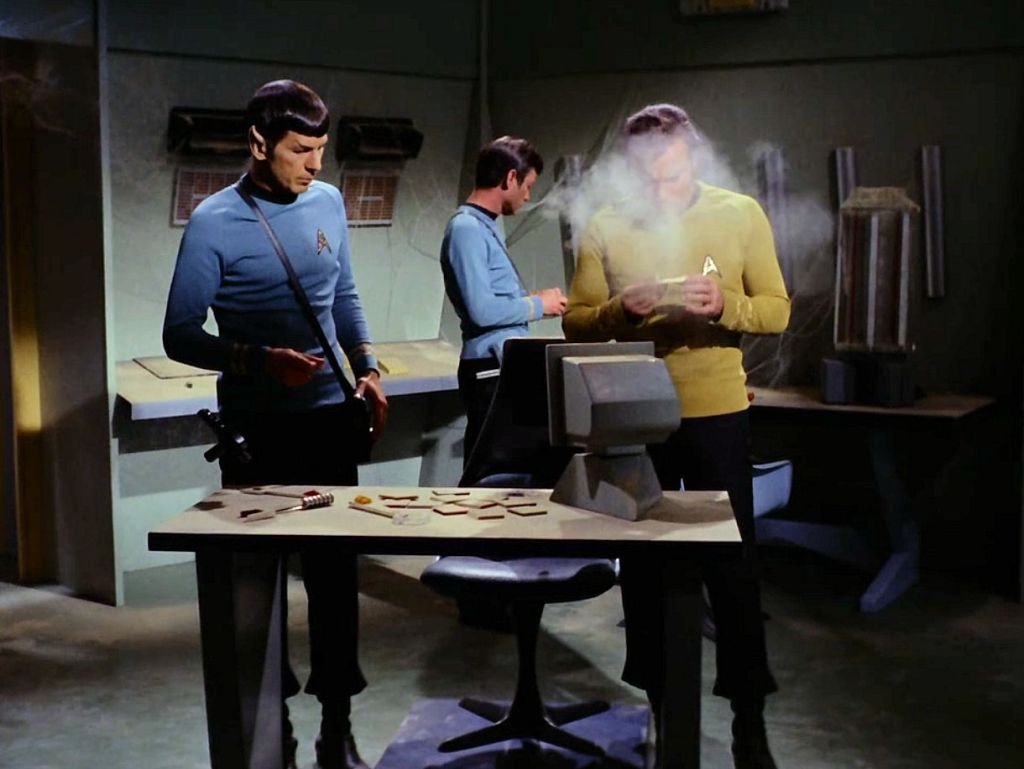
The experimenting aliens call themselves Vians and, like Gem, they presumably come from the Minara system. Spock claims there are “millions of inhabitants” in the Minaran system but the presence of Gem and the Vians is a complete surprise to the landing party. It’s a mystery how the Federation could post a research station on Minara II and know so little about the surrounding planets. In appearance and behavior, the Vians are reminiscent of the Talosians from “The Menagerie.” Like the Talosians, the Vians appear to live undergound, as this is where their research is conducted. This gives the episode an opportunity to criticize a purely intellectual existence isolated from the outside world, as TOS has done several times in the past. “Men weren’t intended to live this far underground,” McCoy says. “It’s just not natural.” (“And space travel is?” Kirk cleverly responds.) While their purpose is different, misguided research as opposed to entertainment, the Vians inflict torture on others out of the same self-entitlement as the Platonians from “Plato’s Stepchildren.” Faced with the question of who to torture next – Spock or McCoy – the Vians casually predict death for McCoy and permanent debilitating damage for Spock. And when McCoy is near death late in the episode, a result of the Vians’ torture, they dismiss his possible loss as “not important.” “Love and compassion are dead in you,” Kirk tells the Vians. “You’re nothing but intellect.”

Most of the episode takes place on a minimalist set that creates the sense of a stage production. It’s a noble effort, but the story is too weak to live up to the production values, and the minimalist staging of “Spectre of the Gun” worked more effectively. Gem’s muteness is symbolic – she is here to bear witness and, hopefully, learn compassion (more on that later). Gem communicates with hand gestures and body language which would likely have seemed appropriately theatrical at the time but today feel dated, like a third-rate production of Hair. And let’s not get started on the stereotypes of a woman as caregiver and sacrificing herself so men can prosper.

The Vians’ ultimate objective is only clear enough to be flimsier than a bad hairpiece. The Vians have the resources to evacuate one species from the Minara system before the sun goes supernova. (So maybe they’re really from another system? We’ll never know.) They’ve chosen Gem as a representative of her species, and if she proves deserving, then the Vians will deem her race worthy of saving. The Vians’ criteria is poorly spelled out. The test involves inflicting suffering on the landing party and finding out if Gem will come to their rescue. “We’ve already observed the intensity of your passions and gauged your capacity to love others,” the Vians tell Kirk as they torture him. “Now we want you to reveal to us your courage and strength of will.” The two Federation researchers were the first set of guinea pigs and the stress of the “experiment” (torture) proved too much for them. The fact that Gem has to be tested at all implies that she and her species start out selfish and lacking in compassion. In fact, this might be justifiable self-preservation, as Gem is, per the episode’s title, an empath. She absorbs the landing party’s emotional and physical experiences. Their physical wounds literally transfer to Gem. “They become part of her,” McCoy says. She is visibly weakened by her ability to absorb – and thereby heal – physical ailments, as when she revives Kirk after the Vians torture him. Will too much healing be fatal to Gem? The question is never resolved, but the possibility causes her hesitation in offering herself in extreme cases.
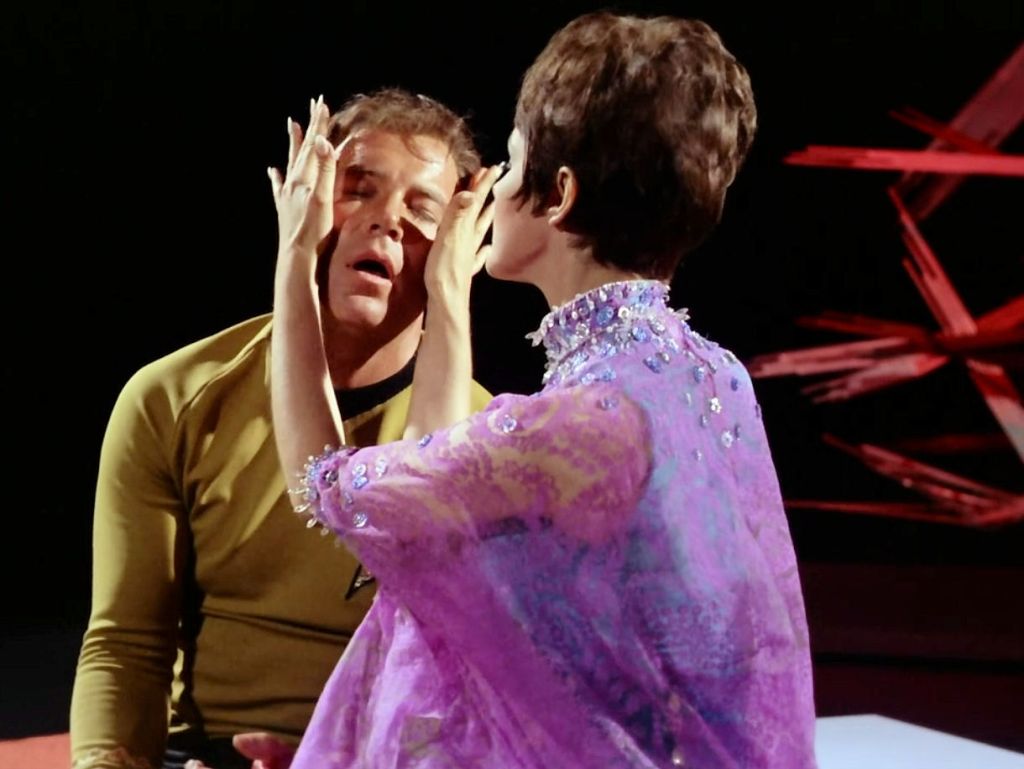
Either way, the Vians’ plan is weak, at best. They assume that Gem is representative of her entire species, and that her mastery of compassion will translate to others of her kind, an outlandish premise given the potential for diversity among every other known species. If Gem proves unworthy and the Vians decide not to save her species, do they plan to subject other inhabitants of the Minaran system to the same experiment? It seems unlikely they have time, as the Vians themselves acknowledge that little time remains until the system is destroyed by the supernova. Or have they already tested other species and found them lacking? It seems most of the systems’ millions of lives will be lost regardless, with the Federation doing nothing to help.

The resolution is convoluted, at best. Gem commits to healing McCoy, despite potential risk to herself, but McCoy fends her off, refusing to take life, even to save his own. One highlight of “The Empath” is that we again see the fearless McCoy of “Space Seed” and, dare I say it, “The Omega Glory.” McCoy is on his best behavior here, keeping the complaining to a minimum and even complimenting Spock when the First Officer tends to McCoy’s wounds: “You’ve got a good bedside manner, Spock.” After Kirk is tortured, Gem hesitates to heal him until the doctor urges her forward. McCoy, more than Kirk and Spock, provides the noble example for Gem to learn from, fully exemplifying the series’ recurring theme of sacrifice. Gem senses McCoy as the emotional center of the trio, tearing up when he leaves to be tortured by the Vians. After Kirk is tortured and still recovering, the Vians expect Kirk to choose between Spock or McCoy as their next lab rat. McCoy forces the decision by sedating Kirk to aid recovery, then sedating Spock by simple sneak attack. The Vians have no choice but to choose McCoy by default.
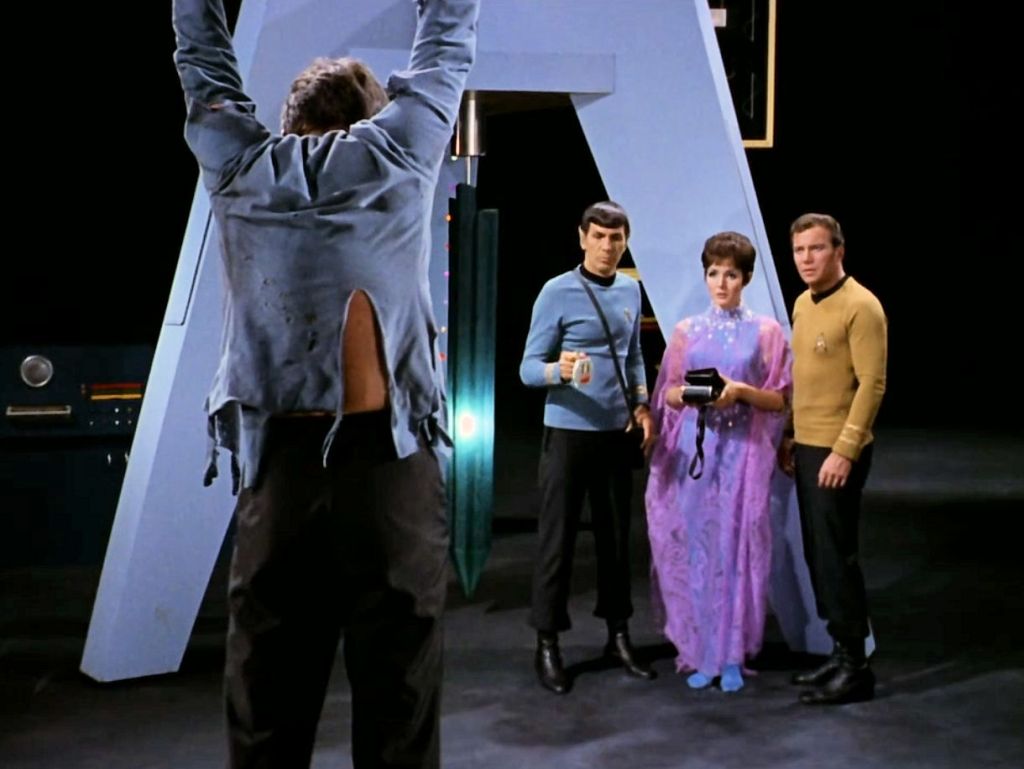
The Vians still intend to abandon the Christ-like Gem and her species, because she does not literally give her life as they expected. Kirk, Spock, and McCoy convince the Vians that they are nitpicking and that Gem’s willingness to sacrifice herself should be all the proof they need. Thank heaven, the entire species will be redeemed from the sacrifice of one individual. As if the very un-Trek-like biblical allegory wasn’t obvious, two scriptural passages are thrown at us to push our free will in the right direction. During the prologue, we see a video log left by the scientists. When one of them curses their remote, barren circumstances, the other replies with Psalm 95:4: “In his hand are the deep places of the earth.” Psalm 95 is often interpreted as “a call to worship,” with verse 4 specifically a reminder to followers of God’s omnipresence. This feels to me like a fairly passive-aggressive comeback to the scientist who is disappointed with local work conditions. Never mind the fact that they’re not even on earth. Then, in the final scene, as the landing party discusses how perfectly wonderful Gem was, an eavesdropping Scott says, “I would say that she was a pearl of great price.” He’s referencing the Gospel of Matthew chapter thirteen, a collection of parables. Scott specifically refers to Matthew 13:45-46, the parable of the costly pearl: “Again, the kingdom of heaven is like a merchant searching for fine pearls, When he found a pearl of great value, he went out and sold everything he had and bought it.” In other words, abandon your heathen ways and go all in on Christianity. See, McCoy told us she was a gem right from the start. Gem was the pearl on which her people could rest their hopes.

The Bible talk feels out of place in a series that has generally expressed humanist values as the cornerstone of Federation principles. The Vians appear to be human fanboys from the get-go, having chosen humans specifically for their praise-worthy character traits. “Their will to survive is great,” one Vian says to the other. “They love life greatly to struggle so.” At the end, when the Vians are too easily convinced to abandon their Old Testament intolerance, they list the vague qualities Gem has learned from the landing party: “Your will to survive. Your love of life. Your passion to know. They are recorded in her being.” It seems odd that the Vians are so easily sold on human exceptionalism when the first two representatives turned out so disappointing. Yet Kirk, Spock, and McCoy behaved exactly as the Vians had hoped: “Each of you was willing to give his life for the others.” At some point the pro-human hyperbole becomes excessive, an over-the-top attempt to define humans as the chosen people among the entire galaxy. “Everything that is truest and best in all species of beings has been revealed by you,” they tell the landing party. “Those are the qualities that make a civilization worthy to survive.” We sure are special! Kirk goes so far as to encourage Spock to share the good news with his homeworld.
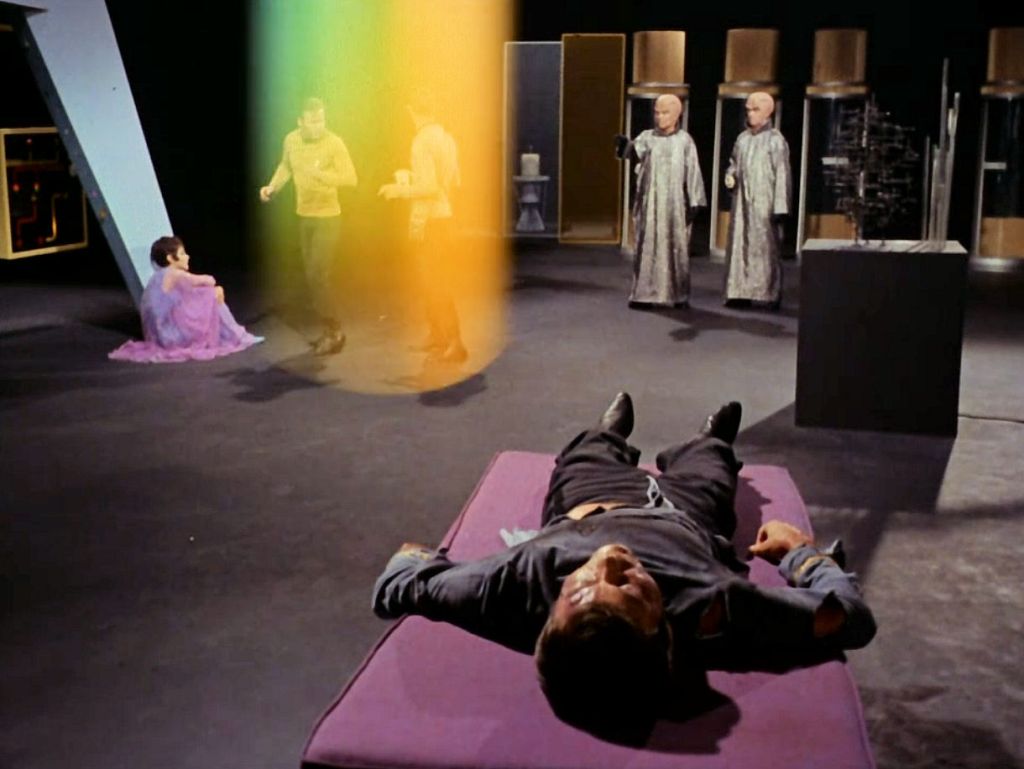
“The Empath” would have been more compelling with less Bible talk and a deeper discussion of the ethics of conducting research on living test subjects, as that is the episode’s one enduring theme. We know almost nothing about Gem and her kind, but they come across as a generally helpless bunch, exactly the type that has been historically exploited for unethical and illegal human experimentation. The least powerful among us – children, the mentally disabled, ethnic minorities, and prison inmates – have been subjected to the most horrific treatment one can imagine. Exposure to deadly pathogens, interrogation experiments, experimental surgery, and application of mind-altering substances are among the “research” inflicted on humans, often without informed consent, or any other consent for that matter. To say nothing of the 500,000+ animals used worldwide in cosmetics testing every year, most of which endure great pain before being killed. Cosmetics testing on animals in the U.S. goes back to the 1938 passage of the Food, Drug, and Cosmetic Act, requiring safety verification of cosmetics products before going to market. The counter argument, of course, is a corollary to “the needs of the many”: some human and animal testing can have tremendous benefit for society – tens of thousands of participants in Covid-19 clinical trials helped make those vaccines available to all of us. Testing cosmetics on animals seems blatantly cruel, but what about potential cancer drugs? Where to draw the line, legally and ethically, is not a simple decision.
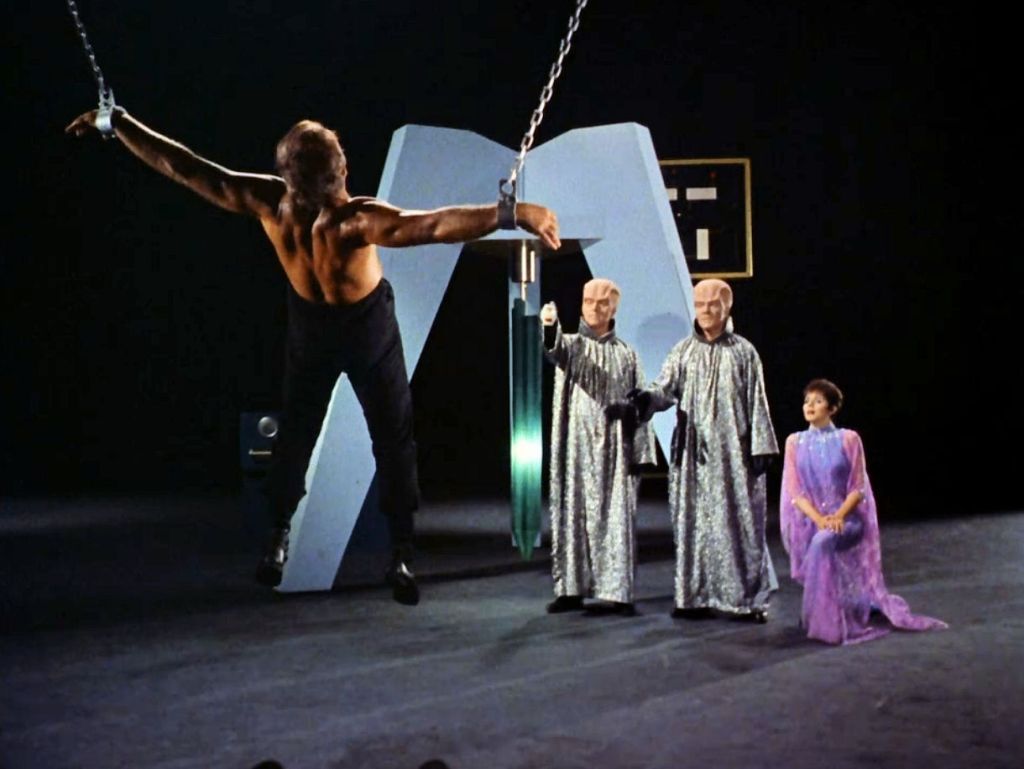
It’s no coincidence that our heroes have come to the Minara system to experience empathy. “Minara” is an Urdu word referring to a tower or minaret. A minaret announces the Muslim call to prayer – a beacon of light to the truth. Here, however, the lesson is inverted: the Enterprise crew brought empathy with them, but the Vians, the people who really need empathy, get off too easily. “You’ve lost the capacity to feel the emotions you brought Gem here to experience,” Kirk tells them. One of the few high points of “Plato’s Stepchildren” is that the Platonian leader learned empathy when he briefly suffered the same pain he inflicted on others. One of the weakest elements of “The Empath” is that the Vians (sounds a lot like “villains,” doesn’t it?) appear to spontaneously develop empathy after a speech from Kirk and Gem’s few minutes of anguish. Like the historic testing on human subjects, and the companies and organizations that test on animals, and all of us who buy products from those companies, suffering has been displaced with no real lesson learned. Which, coincidentally, is the premise of salvation-for-all derived purely from the sacrifice of one individual. We, the viewers, might wish to see ourselves in the heroes, but don’t we really have more in common with the Vians? More compelling, regardless of one’s beliefs, would be a life of you-break-it-you-bought-it, with the consequences of the sin visited upon the sinner. We can’t ask another to live our pain for us. For the journey to truly matter, the risk – and the consequences – must be shared.
Next: Elaan of Troyius